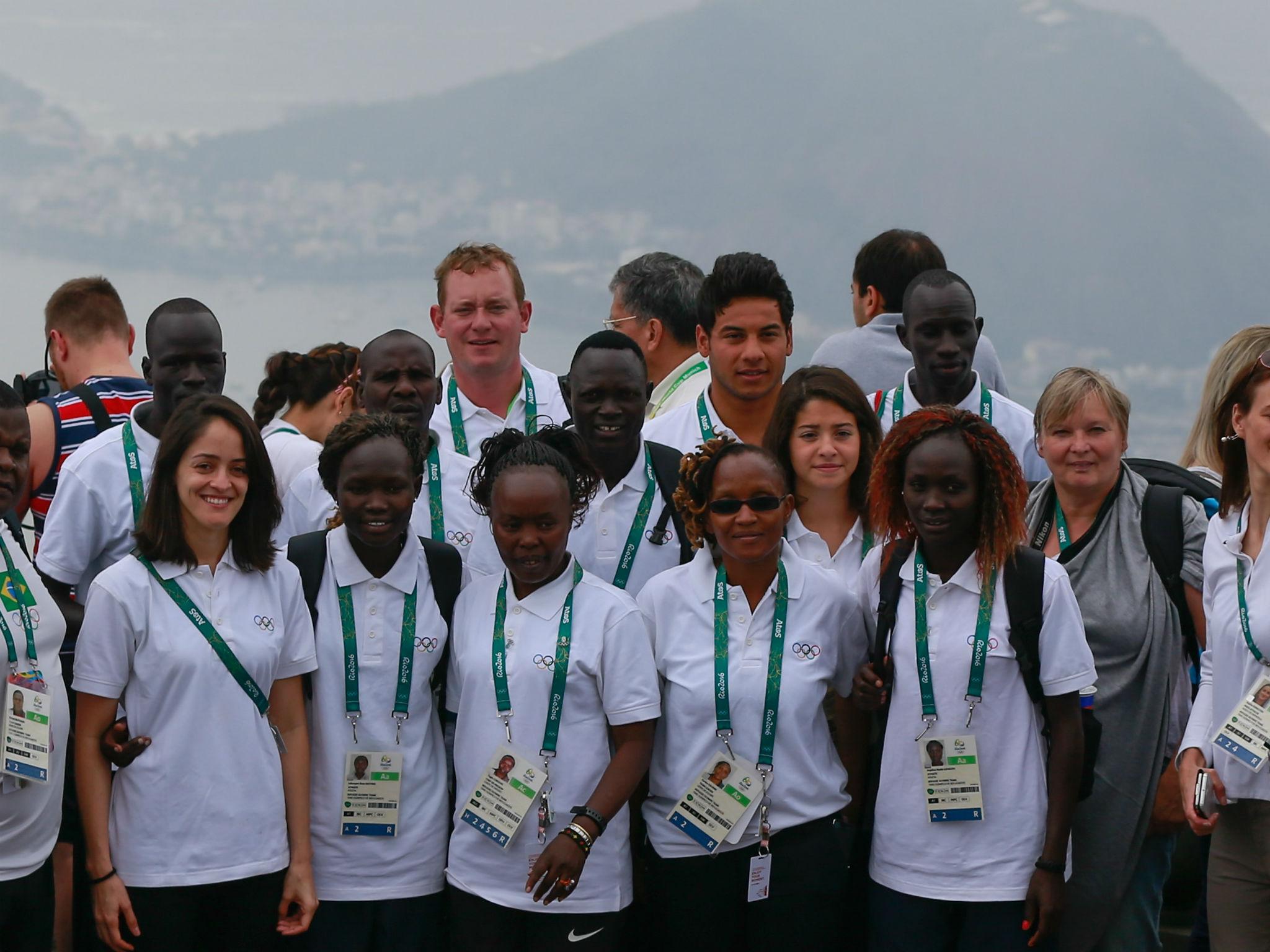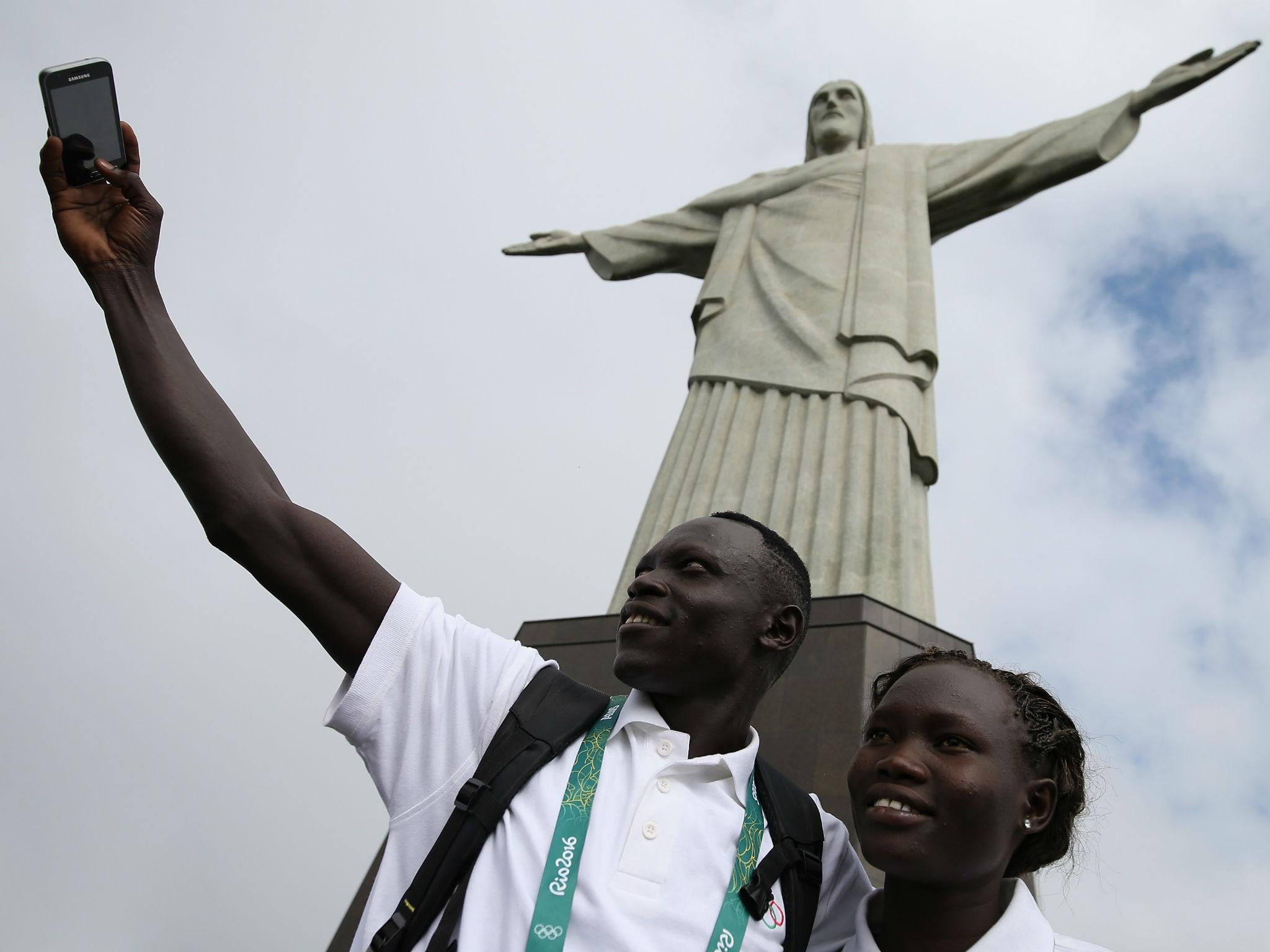Rio 2016 refugee team: Meet the athletes whose stories have inspired the world
The team includes a runner who only got a pair of trainers last year and a swimmer who saved 20 lives
Your support helps us to tell the story
From reproductive rights to climate change to Big Tech, The Independent is on the ground when the story is developing. Whether it's investigating the financials of Elon Musk's pro-Trump PAC or producing our latest documentary, 'The A Word', which shines a light on the American women fighting for reproductive rights, we know how important it is to parse out the facts from the messaging.
At such a critical moment in US history, we need reporters on the ground. Your donation allows us to keep sending journalists to speak to both sides of the story.
The Independent is trusted by Americans across the entire political spectrum. And unlike many other quality news outlets, we choose not to lock Americans out of our reporting and analysis with paywalls. We believe quality journalism should be available to everyone, paid for by those who can afford it.
Your support makes all the difference.For the first time in Olympic history, a refugee team is competing.
The ten athletes, who are competing in events from judo to marathon running, are serving as a “symbol of hope” for refugees.
The inclusion of the team at the 2016 Rio Games reflects the steadily growing refugee crisis and shines a light on the plight of millions of displaced people displaced by war and conflict across the world.
The team walked into the Maracana stadium to a standing ovation at the opening ceremony on Friday. Two Syrian teammates have already captured global attention during their events: Yusra Mardini won her 100-metre butterfly heat on Saturday and on Tuesday, Rami Anis achieved a personal beast in the swimming freestyle heat.
Who are these ten athletes and what are their stories?

Rami Anis, a swimmer from Syria
Anis competed in the Men’s 100-metre swimming freestyle on Tuesday.
The 25-year-old hails from Aleppo, in Syria, where he began swimming at 14. As civil war intensified in the country, Anis and his family fled to Istanbul where he continued training. However, because he was not a Turkish national, he was prevented from competing in national events.
Anis left Turkey and crossed the sea in a dinghy, eventually arriving in Greece before seeking asylum in Belgium.
Anis left Syria with only one small bag containing two jackets, two t-shirts and two pairs of trousers, “I thought I would be in Turkey for a couple of months and then return to my country,” he said. After his race on Tuesday, the athlete said he hopes to return to the Games in 2020, this time representing Syria.
He will compete again on Thursday in the Men's 100m butterfly event.

Yiech Pur Biel, a runner from South Sudan
Pur Biel fled civil war in Sudan alone as a teenager and settled on his own in a Kenyan refugee camp. In the camp he played football and began running just one year ago.
“In the refugee camp, we have no facilities – even shoes we don’t have,” he said.
He will compete in the 800 metres running event and has said of his chances: “Even if I will not get gold or silver but I will show the world that being a refugee, you can do something.”
Yolande Bukasa Mabika, a judoka from the Democratic Republic of the Congo.
Mabika doesn’t remember much of her escape from eastern DRC, after fighting in the region separated her from her parents, apart from running and being picked up by a helicopter which transported her to the capital of Kinshasha.
While in the capital she lived in a centre for displaced children where she took up judo, which she says gave her a “strong heart”.
“I got separated from my family and used to cry a lot. I started with judo to have a better life,“ she said.
But the 28-year old suffered abuse at the hands of her coaches and said she would be locked up after losing games. She applied for asylum while competing in Rio in 2013 and will compete in the 70kg event on Wednesday.
James Nyang Chiengjiek, 800-m, South Sudan
Chiengjiek fled southern Sudan aged 13 to avoid being kidnapped by rebels who were taking children to be soldiers. He fled to Kenya where he settled in the Kakuma Camp, attended school and began running but did not always have the right shoes. “We all got a lot of injuries because of the wrong shoes we had," he said.
Speaking of his trip to Rio, he said: “My dream is to get good results at the Olympics and also to help people. Because I have been supported by someone, I also want to support someone.”
Chiengjiek will compete in the 800-m on Saturday.
Yusra Mardini, a swimmer from Syria
Mardini has already won hearts around the world after winning her swimming heat on Saturday.
Already a talented swimmer in war-torn Damascus, the 18-year-old was forced to flee the country with her sister, travelling through Lebanon and Turkey before trying to reach Greece. Thirty minutes after setting off from Turkey, the motor on their boat, which was meant for six people but carrying 20, began to fail. Most of those on board it could not swim. Mardini, her sister Sarah and two strong swimmers jumped into the sea and swam for three hours in open water to stop their dinghy from capsizing, eventually reaching Lesbos. She has since settled in Berlin.
Rose Nathike Lokonyen, a runner from South Sudan
Lokonyen fled southern Sudan aged 10, she has since spent 13 years at the Kakuma refugee camp in Kenya. She began running in school yet only began wearing running shoes a year ago. Prior to that she was regularly running distances of 10k barefoot.
Her parents have since returned to south Sudan yet she has stayed in Kenya. “My dream, my first priority, is to help my parents and my siblings and then after that to help my fellow refugees,” she says. She will compete in the 800 metres.

Yonas Kinde, a marathon runner from Ethiopia,
At 36-years-old, Kinde is the eldest member of the refugee team and will be competing in the marathon.
He fled Ethiopia and now lives under special protection in Luxembourg. “I left my country because of political problems,” he says. “There are many difficulties, morally, economically and it’s very difficult to be an athlete.”
In Luxembourg, Kinde is a taxi driver but has also won several marathon titles in the country as well as in France and Germany.
Anjelina Nadai Lohalith, a runner from South Sudan,
Lohalith fled her home in southern Sudan when she was six-years-old and has not seen or spoken to her parents since. Finding and helping them is her main motivation coming into the Games.
Lohalith, 21, settled in the Kakuma refugee camp in Kenya since she fled her country and took up running while attending primary school. She will compete in the 1500 metre heats on Saturday.
Popole Misenga a judoka from the Democratic Republic of the Congo
At nine years old, Misenga fled the fighting which killed his mother in the DRC but became separated from his family. He was rescued eight days later from a forest and taken to Kinshasha. He discovered judo while at a centre for displaced children in the capital and credits it with changing his life.
He later fled Kinshasha and gained refugee status in Brazil. “I want to be part of the Refugee Olympic Athletes team to keep dreaming, to give hope to all refugees and take sadness out of them. I want to show that refugees can do important things,” Misenga says.
He will compete on Wednesday in the Men’s 90kg event.

Paulo Amotun Lokoro, 1500m runner from South Sudan
Lokoro was a cattle herder on his family’s plains but fled his southern Sudan village due to the conflict in the region. “We ran to the bush and stayed in the bush. There was no food, we just ate fruit,” he says.
After reaching his mother in Kenya’s Kakuma refugee camp, the 24-year-old began running. “I know I am racing on behalf of refugees,” he said. I was one of those refugees there in the camp and I have reached somewhere special.”
Join our commenting forum
Join thought-provoking conversations, follow other Independent readers and see their replies
Comments